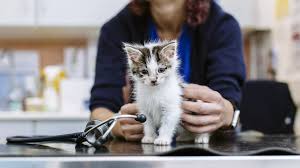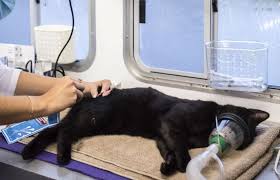
Cats are masters at hiding their pain and discomfort, a survival tactic learned from their wild ancestors. This means your cat might be dealing with a health issue long before you actually notice anything’s wrong. Regular vet visits are your frontline defense in catching these problems early, ensuring a long, healthy life for your feline friend. Early detection is key. When you take your cat to the vet regularly, you’re giving the vet a chance to spot issues before they become serious. Things like dental disease, kidney issues, and even cancer can be treated more effectively if caught early. Think of it like maintaining a car—routine checkups can prevent a major breakdown down the road.
Don’t skip those vet visits just because your cat looks healthy. Some conditions, like high blood pressure or early kidney disease, don’t have obvious symptoms you can see at home. Regular checkups help in identifying these ‘silent’ health threats. Your vet will run a variety of tests and perform physical checks to make sure your cat is in tip-top shape.
Routine vet visits also give you a chance to ask questions about your cat’s health and behavior. Maybe you’ve noticed a change in appetite, or perhaps your cat seems less playful. These could be signs of underlying health issues that a vet might catch. It’s also a good time to discuss diet, grooming, and any preventive measures you should be taking.
So, even if your cat seems perfectly fine, those regular vet trips are non-negotiable. They’re an investment in the long-term health and happiness of your furry companion. Regular vet visits mean a healthier, happier life for your cat and peace of mind for you.
Kitten Care: A Guide to Vet Visits for Your Young Feline
Kittens are bundles of energy and curiosity, but their little bodies are still developing and need a lot of attention. Monthly checkups until they hit 4 months are essential. With their immature immune systems, they’re more vulnerable to infections and parasites.
During these visits, the vet will do a thorough physical exam, checking their weight, organs, heart, lungs, and for congenital abnormalities. This helps catch any early issues that could affect their growth.

Deworming is another biggie. Kittens should be dewormed every 4 weeks until they are 6 months old. After that, it’s every 1–3 months. Parasites can cause a lot of health problems, so staying on top of this helps establish a routine of good health.
Vaccinations are also crucial. These should start when kittens are 6-8 weeks old. Core vaccines include rabies, calicivirus, and feline distemper. These vaccines protect against common but serious diseases and are a must for your growing kitten.
These frequent visits are not just about shots and deworming, though. It’s a great chance to get your questions answered. Wondering about diet changes, litter box training, or weird behaviors? Your vet has seen it all and can offer valuable advice.
Keeping Adult Cats Healthy: The Role of Routine Vet Visits
When your cat graduates from kittenhood to adulthood, their health needs might change, but regular vet visits remain just as important. The general recommendation is to take your adult cat to the vet every six months, though this can vary based on age, medical history, and any specific concerns.
These routine visits cover a lot of ground. Your vet will screen for diseases, ensure vaccinations are up to date, provide preventative care, and offer nutritional advice tailored to your cat’s lifestyle. It’s a comprehensive checkup that keeps your cat on the right track.
Disease screening isn’t scary—it’s proactive. Regular blood tests, urinalysis, and fecal exams help catch infections, parasites, and chronic conditions early. Knowing what’s going on inside your cat’s body means you can tackle issues before they escalate into something more serious.
Vaccinations continue to play a role in your cat’s health even into adulthood. Boosters for diseases like rabies and distemper are essential; they keep your cat protected from harmful viruses and bacteria that they might encounter.
Don’t forget about preventative care. This includes treatments for fleas, ticks, and heartworms. Even indoor cats can be at risk, so your vet may recommend specific products or treatments to keep these pests at bay.
Nutritional advice can also be extremely helpful. Cats are prone to weight issues, and what they need nutritionally can change with age. Your vet can provide guidance on the best diet for your adult cat, ensuring they’re getting the right balance of nutrients.
Sometimes, your vet might suggest further tests based on what they find during the checkup. It’s not about being alarmist; it’s about making sure every little detail is covered. The health of adult cats can change quickly, and staying one step ahead is always a good move.
Senior Cats: Special Considerations for Routine Vet Visits
As cats enter their senior years, their health needs become more complex. Those twice-yearly vet visits become even more crucial. With age, cats face a higher risk of weight changes, dental issues, and age-related conditions like arthritis or kidney disease.
One key focus during these visits is monitoring weight. Older cats can lose weight rapidly due to conditions like hyperthyroidism or kidney disease. Conversely, they can also gain weight due to reduced activity levels. Regular weigh-ins help catch these changes early, allowing for timely intervention.

Dental health is another crucial aspect. Dental disease is common in senior cats and can lead to other health issues if left untreated. During bi-annual visits, your vet will check for signs of gum disease, tooth decay, and other dental problems that might be causing pain or difficulty eating.
Age-related issues like arthritis require special attention. Symptoms can be subtle—maybe your cat is less eager to jump on furniture or seems stiffer when moving. Your vet can recommend treatments or supplements like glucosamine and chondroitin to help manage these conditions and improve your cat’s quality of life.
Immediate vet consultation is advised if you notice unusual behavior or discomfort. Things like increased drinking, frequent urination, or changes in appetite can be indicators of underlying problems. The earlier you address these signs, the better the outcome for your cat.
Addressing Common Health Problems in Cats
Obesity is a growing concern among cats, with up to 63% of them globally being overweight. It’s crucial to monitor your cat’s weight. If you notice it’s difficult to feel their ribs or hip bones, it’s time to talk to your vet about a weight management plan. Specialized diets and controlled portions can make a huge difference.
Joint problems often sneak up on adult and senior cats. Signs include stiff walking, avoiding stairs, reluctance to jump, and a lackluster coat. If you spot these symptoms, a vet consultation is essential. They might suggest joint care diets enriched with Omega 3 and 6, glucosamine, and chondroitin to help ease discomfort and improve mobility.
Regular vet visits can also catch other common issues like dental disease, kidney problems, and diabetes early. Each of these conditions has its own set of symptoms and treatment plans, making routine checkups and open communication with your vet indispensable.
Preventative care goes beyond just treating problems as they arise. It’s about fostering a lifestyle that minimizes risk. Regular exercise, a balanced diet, and attention to dental hygiene are all critical components. Your vet can offer specific advice tailored to your cat’s needs, helping you create a healthy and happy life for your furry friend.
At the end of the day, the goal is to keep your cat healthy, comfortable, and active throughout their life. Regular vet visits, combined with observing your cat at home, form the cornerstone of effective health management. Always prioritize checkups and seek professional advice when needed. It’s the best way to give your cat the long, joyful life they deserve.

